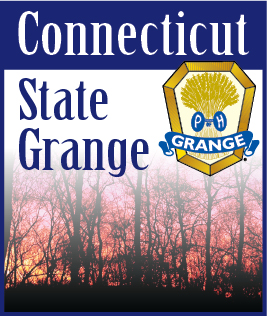| JUNE 7, 2010 -- The Grange is familiar to most for the historic, white buildings that dot the landscape and serve as reminders of Maine's agricultural past.
But the heart of the Grange still beats in those familiar halls, inside the people who gather to learn, enjoy each other's company and, most of all, help.
"The biggest thing with most of our Granges are the community organizations, whether they be big projects or small ones," said James Owens, master of the Maine State Grange.
The National Grange -- officially known as the Order of Patrons of Husbandry -- was organized in 1867 to represent farmers in a manner similar to the unions that were beginning to represent industrial workers at the time.
The Maine Grange was organized in 1873. Within a year, there were 64 Granges with about 2,000 members, according a history posted on the Maine State Grange website. Membership rose to more than 55,000 by the early 1900s, giving Maine the largest per-capita Grange membership in the nation.
Cultural changes and the decline of farming began eroding Grange membership in the 1960s. All told, there were 180 Granges with about 8,000 members as of 2006.
The Grange, particularly at the national level, is still heavily involved in lobbying for the rights of farmers and rural residents, but there is now a particular interest in community service. Maine Grange members do everything from knit hats for newborn babies to cemetery repair.
"Our focus has changed since we started because we don't have the same types of farms or the number of farms," Owens said.
"The Grange used to be the only thing people had to get their voices out there," said Gay Anderson, master of the Mill Stream Grange in Vienna who has been a member for about 20 years. "It's still agricultural, but it's also social. We're like a family."
The Grange gave Anderson and her husband, Raymond, nearly instant roots in the community when they moved to Vienna. New and summer residents of the town are still encouraged to attend.
"It's wonderful," Anderson said. "What we offer is a way to meet their neighbors."
Or, as in the case of Karen and Michael Flagg, of Greene, your spouse.
"I met him at a Grange cookout," Kar
en Flagg said. "We got married at a Grange meeting, under 'new business'."
Karen Flagg, secretary of the Androscoggin County Grange in Greene, started a Junior Grange program -- one of just one of three in the state -- two years ago. The program has 12 members between the ages of 5 and 14.
The Junior Grangers, like their adult counterparts, are active in community service. Last year, the group collected 98 pounds worth of soda can tabs as a fundraiser for the Shriners Hospital.
Karen Flagg believes the Junior Grange helps children develop maturity, respect and confidence.
"They hold positions just like they do in the adult Grange," Flagg said. "They go to the adult meetings and, a lot of times, they act better than the adults."
The commitment to serve and build community have helped keep the Grange going, Owens said. Maintaining and increasing membership is always a concern, and there have been local Granges that have disappeared for lack of interest.
But statewide, the Grange continues to hold its own.
A dozen people recently took part in a membership ceremony in Fairfield and similar programs were being planned for Rockport, Kenduskeag and Danville Junction, in Auburn.
"We like more, but this is good," Owens said.
Karen Flagg is seeing more interest from parents looking for an escape from televisions and computers.
"Membership is starting to pick up because people are ... looking for more family-oriented things," she said.
Creating that family atmosphere is part of the reason Flagg is eager to have her Junior Grange members attend the adult meetings.
"We want them here," she said. "They're our future."
Susan Hackett, a member of the Topsham Grange, said that, when she joined more than 45 years ago, parents would get their children to join.
"Now it's sort of the same way, but there's not so many parents who belong," Hackett said. "It's more the grandparents. The grandparents get their children to belong."
Hackett has traveled all over the country with the Grange. Young people still get to travel all over the state and Northeast to attend meetings and activities, Hackett said. The Grange also hosts regional and national public speaking and sign-language competitions.
"They'll meet all kinds of other youth and junior-aged kids," Hackett said. "It really is a good activity for them."
Anderson, in Vienna, believes the key to increasing membership is simply letting the public know what the Grange offers.
"People don't even know what the Grange is anymore," she said. "It's really a shame."
|
